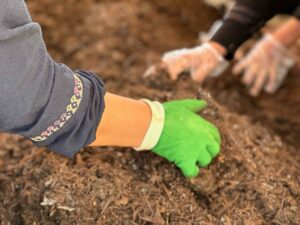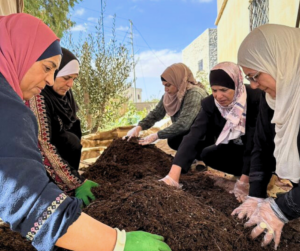Nour Hammad, The Regional Office in Amman, Jordan
Febrauary 4th, 2024
The village of Al-Manshiyyah, located approximately 13 kilometers from the city of Mafraq, unfolds the story of Mona, a Jordanian woman and homemaker residing in this small community. Despite earning a university degree, Mona faced challenges in securing job opportunities, which are predominantly concentrated in the Jordanian capital, Amman. Driven by the determination to improve her livelihood, she embarked on a quest for opportunities to enhance her living conditions. 
Through an announcement on Facebook by the Manshiyyah Bani Hassan Charitable Society regarding three training courses offered as part of the “Income Generation for Women after COVID-19” project, Mona discovered the opportunity to learn organic compost production. She enrolled in the course to support her family and assist her husband in covering household expenses.
In the theoretical and practical sessions of the course, Mona acquired knowledge on producing high-quality compost and selling it in the local market. Upon completing the course, she could produce her own compost and utilize it on her small farm. Additionally, she began selling compost to her neighbors, contributing to the improvement of her family’s financial situation. 
Mona’s efforts have evolved, and she is now the proprietor of a worm farm (vermicompost). Starting with ten worms as a gift from the trainer, she currently manages an ever-growing population of worms. She utilizes the compost she produces on her home plants, emphasizing its 100% natural and organic nature. Mona added, “The process of producing organic compost does not require significant effort or additional costs, as it relies on recycling household waste.”
